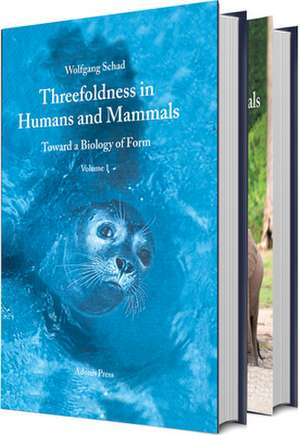Threefoldness in Humans and Mammals
Autor Wolfgang Schad Traducere de Catherine E Creegeren Limba Engleză Hardback – 15 feb 2021
The result of more than fifty years of research, Threefoldness in Humans and Mammals is the beautiful, authorized edition of Wolfgang Schad's lifework. In chapter after chapter of this monumental two-volume work, Schad demonstrates in detail how the dynamic concept of the threefold organism--first described by Rudolf Steiner a hundred years ago--sheds new light on aspects of the mammals, such as their size, form, coloration, physiology, embryonic development, behavior, and habitat. Indeed, he shows how a key to understanding the extraordinary diversity of our closest animal relatives is, in fact, the threefold nature of the organism--consisting of the nerve-sense system on the one hand, the metabolic-limb system on the other, and the mediating circulatory-respiratory system.
Reading this book, one can experience a growing sense of satisfaction, even wonder, realizing that each species, through its particular constitution, actually explains itself--that right down into its specific features it expresses its own unique embodiment of the threefold organization. Moreover, the reader begins to experience the threefold organism itself--not as an abstract, rigid thought construct against which the mammals can be measured and categorized, but as a creative, lawful principle that comes to unique expression in each species.
Thus, Schad follows in the footsteps of Johann Wolfgang Goethe, who said of his scientific pursuits: "The ultimate goal would be to grasp that everything in the realm of fact is already theory.... Let us not seek for something behind the phenomena--they themselves are the theory."
The first volume offers a comprehensive description of the threefold human organism that lays the groundwork for a detailed consideration of the most familiar groups of mammals, including stunning chapters on antelopes and deer with their horns and antlers and a concluding chapter on mammals' intimate relationship with their natural environment. The second volume begins with chapters on the more primitive mammals and continues with studies of mammalian embryology, milk, emotional life, and relationship to death. Volume 2 concludes with a chapter on human threefoldness.
The reader will do well to begin with the first chapters in volume 1, which introduce the main motifs that recur and build throughout the book. Although the content includes a great deal of specialized knowledge, it is presented in language accessible to the general reader. Moreover, the theme of threefoldness in humans and mammals uncovers the natural affinity between our own threefold organization and that of the mammals--an affinity that affords us direct experience of their particular nature and enhances our understanding and empathy for them.
The text is richly illustrated with well-chosen photographs and drawings. Numerous diagrams illumine the dynamic interrelationships within various groups of mammals. The two-volume set is protected in a sturdy, handsome slip case. In both form and content, this is a classic edition of a groundbreaking work that should find its place in every home, school, biology department, and library.
Preț: 732.63 lei
Preț vechi: 893.45 lei
-18% Nou
Puncte Express: 1099
Preț estimativ în valută:
140.23€ • 152.38$ • 117.87£
140.23€ • 152.38$ • 117.87£
Carte indisponibilă temporar
Doresc să fiu notificat când acest titlu va fi disponibil:
Se trimite...
Preluare comenzi: 021 569.72.76
Specificații
ISBN-13: 9780932776648
ISBN-10: 0932776647
Pagini: 1327
Dimensiuni: 179 x 257 x 96 mm
Greutate: 3.83 kg
Editura: Adonis Press
ISBN-10: 0932776647
Pagini: 1327
Dimensiuni: 179 x 257 x 96 mm
Greutate: 3.83 kg
Editura: Adonis Press
Notă biografică
Wolfgang Schad (1935-2022) was Professor at the University of Witten/Herdecke in Germany. Born in southern Germany, he studied biology, chemistry, and education before becoming a science teacher in 1962 at the Goetheschule (Waldorf school) in Pforzheim. From 1975 until 1991, he taught at the Seminar for Waldorf Education in Stuttgart and, in 1992, was appointed head of the Department of Evolutionary Biology and Morphology at the University of Witten/Herdecke, a position he held until retiring in 2005.
